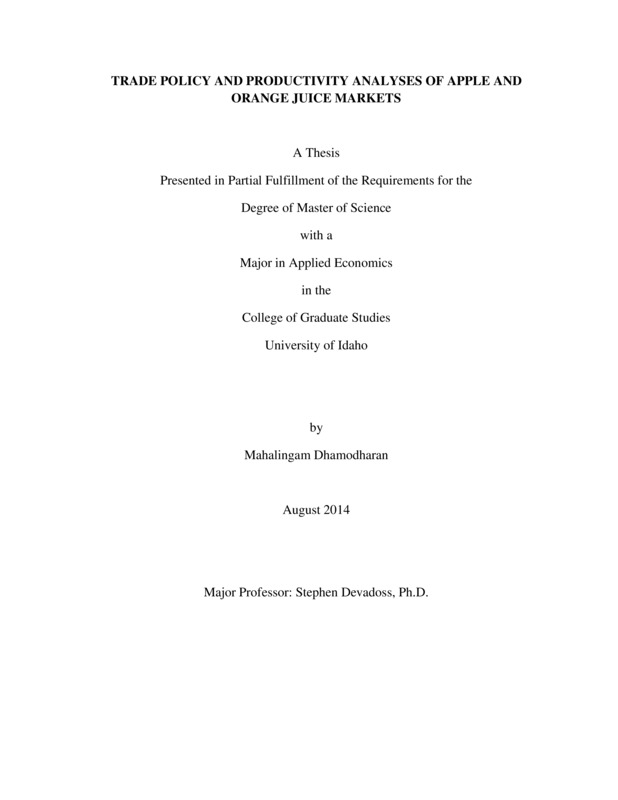Trade Policy and Productivity Analyses of Apple and Orange Juice Markets
Dhamodharan, Mahalingam. (2014). Trade Policy and Productivity Analyses of Apple and Orange Juice Markets. Theses and Dissertations Collection, University of Idaho Library Digital Collections. https://www.lib.uidaho.edu/digital/etd/items/dhamodharan_idaho_0089m_10387.html
- Title:
- Trade Policy and Productivity Analyses of Apple and Orange Juice Markets
- Author:
- Dhamodharan, Mahalingam
- Date:
- 2014
- Keywords:
- apple juice new trade theory oligopolistic competition orange juice productivity trade policy
- Program:
- Agricultural Economics and Rural Sociology (Applied Economics)
- Subject Category:
- Agriculture economics
- Abstract:
-
The goals of this thesis are to a) analyze the impact of trade liberalization and productivity changes on the apple juice markets in the United States and China and b) examine the effects of tariff reduction and productivity improvements on orange juice markets in the United States, European Union, and Brazil.
Chapter 2 titled "A Strategic Trade Analysis of U.S. and Chinese Apple Juice Market", examines the effects of a change in the U.S. tariff and Chinese productivity on the apple juice market in the United States and China. Because of high competition from Chinese apple juice processors, the United States imposed an anti-dumping duty on apple juice imports from China to protect the domestic processors. This trade policy benefited U.S. processors, but negatively impacted Chinese processors as well as consumers in the United States. Because of the economic reforms, foreign direct investment, and technological spillover, Chinese apple processors have increased their productivity. Under oligopolistic competition with endogenous firm entry and exit, this chapter analyzes how the changes in U.S. tariff policy and Chinese productivity impact the market structure in the United States and China and prices, quantities, and U.S. and Chinese welfare. Trade liberalization and an increase in Chinese productivity help U.S. consumers and Chinese processors. However, U.S. tariff removal adversely affects U.S. apple juice processors.
Chapter 3 titled "Analysis of Trade Liberalization and Productivity Changes in the Orange Juice Market", analyzes the oligopolistic competition of Florida and Sao Paulo orange juice processors. Orange juice processors in Florida face stiff competition from São Paulo processors. The United States imposes a specific import tariff to protect the domestic processors, whereas the European Union imposes an ad valorem tariff on orange juice imports. These trade policies benefit Florida processors, but harm São Paulo processors as well as consumers in the United States and the European Union. Under oligopolistic competition with endogenous firm entry and exit, this chapter analyzes how the changes in tariff policy and productivity impact the market structure in Florida and São Paulo and prices, quantities, and welfare in the United States, Brazil, and the European Union. Free trade and an increase in São Paulo productivity help consumers and São Paulo processors. In contrast, U.S. tariff reduction adversely impacts Florida processors.
- Description:
- masters, M.S., Agricultural Economics and Rural Sociology (Applied Economics) -- University of Idaho - College of Graduate Studies, 2014
- Major Professor:
- Devadoss, Stephen
- Committee:
- Luckstead, Jeff; Foltz, John
- Defense Date:
- 2014
- Identifier:
- Dhamodharan_idaho_0089M_10387
- Type:
- Text
- Format Original:
- Format:
- application/pdf
- Rights:
- In Copyright - Educational Use Permitted. For more information, please contact University of Idaho Library Special Collections and Archives Department at libspec@uidaho.edu.
- Standardized Rights:
- http://rightsstatements.org/vocab/InC-EDU/1.0/

